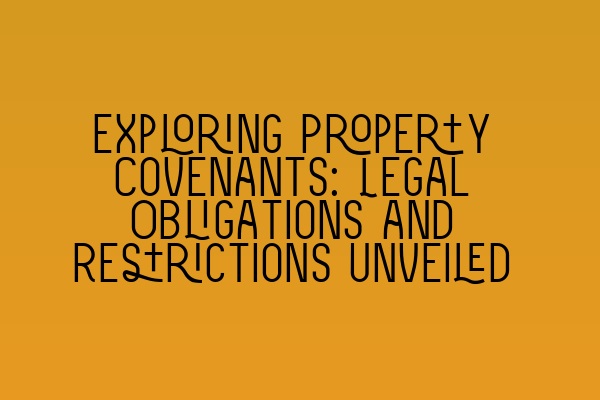Exploring Property Covenants: Legal Obligations and Restrictions Unveiled
When it comes to property ownership, there are various legal obligations and restrictions that property owners need to be aware of. One of the most common types of legal obligations and restrictions are property covenants. In this blog post, we will delve into the intricacies of property covenants, their purpose and types, and their implications on property owners.
What are Property Covenants?
A property covenant is a legal agreement or obligation that is attached to a property deed. It outlines certain conditions or restrictions that the property owner must comply with. These conditions are designed to maintain the integrity and value of the property, and to ensure that all residents within the same development or area are in agreement.
Property covenants can be either positive or negative. Positive covenants require the property owner to do something, such as maintaining a certain standard of landscaping, while negative covenants prohibit the property owner from doing something, such as running a business from the property.
Purpose of Property Covenants
The main purpose of property covenants is to regulate and protect the rights and interests of all parties involved. They are put in place to ensure that the property and surrounding areas are used and maintained in a way that benefits all residents and maintains the overall aesthetics and value of the properties.
By establishing property covenants, developers and homeowners’ associations can create a standardized set of rules and guidelines that every property owner within a development must follow. This helps to create a cohesive and harmonious community that is attractive to potential residents and maintains property values.
Types of Property Covenants
There are various types of property covenants that can be imposed on a property. Some common types include:
- Architectural restrictions: These covenants dictate the architectural style, materials, and design that must be adhered to when constructing or renovating a property. They aim to maintain consistency in the appearance of the properties within a development.
- Land use restrictions: These covenants regulate how the land can be used, such as prohibiting certain commercial activities, restricting the number of units on a property, or specifying the allowable uses for different zones within a development.
- Maintenance requirements: These covenants outline the maintenance obligations of the property owner, such as keeping the property in good repair, maintaining landscaping, or repainting the property at regular intervals.
- Approval processes: These covenants require property owners to seek approval from a homeowners’ association or architectural review board before making any changes or modifications to the property.
Implications of Property Covenants
Failure to comply with property covenants can have serious consequences for property owners. In most cases, the enforcement of property covenants lies with the homeowners’ association, which has the authority to take legal action against non-compliant property owners.
The consequences of breaching property covenants can include fines, forced compliance, or even legal action seeking damages. Therefore, it is crucial for property owners to understand and comply with the property covenants to avoid potential legal entanglements.
Conclusion
Property covenants play a vital role in maintaining the integrity, value, and harmony of residential developments. By adhering to property covenants, property owners can ensure a pleasant and uniform living environment for themselves and their fellow residents. Understanding the purpose and implications of property covenants is essential for all property owners, as it allows them to meet their legal obligations and avoid any legal repercussions.
For more information about property law or other legal matters, feel free to browse our related articles:
